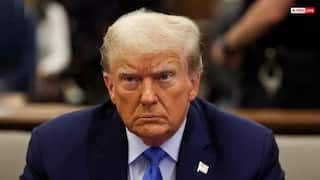Supreme Court Upholds Abrogation Of Article 370, Orders Polls In J&K By September 2024
Article 370 Hearing: The Supreme Court said Article 370 was a temporary provision and upheld the Centre's decision to abrogate it.

Four years after Jammu and Kashmir lost its special status, the a five-judge bench of the Supreme Court on Monday said the Centre's decision to abrogate Article 370 was constitutionally valid even as it sought restoration of statehood for the Union Territory at the earliest. The apex court held that Article 370 was a temporary provision and the President had the power to revoke it.
"We hold exercise of presidential power to issue constitutional order abrogating Article 370 of Constitution as valid. We do not find the use of presidential power was malafide," a five-judge Constitution bench led by Chief Justice of India DY Chandrachud said.
In a unanimous judgment, the Supreme Court said Jammu and Kashmir did not retain its internal sovereignty after accession to Union of India.
"We hold that Article 370 is a temporary provision. It was introduced to serve transitional purpose to serve an interim process. It was for a temporary purpose because of war conditions in the state," the SC said.
While upholding the reorganisation of Ladakh as Union Territory, the Supreme Court asked the Election Commission to conduct election to the Legislative Assembly of Jammu and Kashmir by September 30, 2024.
"We direct that restoration of statehood in Union Territory of J&K shall be done at the earliest," the CJI said.
The top court had reserved its verdict on the matter on September 5 following a 16-day hearing. On August 5, 2019, the Centre had revoked the special status of Jammu and Kashmir granted under Article 370 and split the region into two Union Territories.
In a separate but concurring judgment, Justice SK Kaul suggested the setting up of a "Truth and Reconciliation" committee to investigate violations of human rights both by state and non-state actors since 1980s. "The commission must be set up before memory escapes. The exercise must be time-bound," he said.
During the hearing, the petitioners had argued that Article 370 could not have been abrogated as it acquired a permanent status following the dissolution of the erstwhile Constituent Assembly of J&K in 1957.
The petitioners, represented by a battery of lawyers like Kapil Sibal and Dushyant Dave, said Parliament did not have the authority to declare itself the legislature of J&K for Article 370's abrogation.
Defending its decision, the Centre argued there was no "constitutional fraud" in annulling Article 370 and said the erstwhile state of J&K had fully surrendered its sovereignty to the Union of India upon accession. The Centre said that the petitioners were confusing internal sovereignty with autonomy.
The Centre further said that since Article 370 was repealed, the region saw an "unprecedented era of peace, progress and prosperity".
MUST READ: Article 370 Recap: Accession Condition To Abrogation — J&K Special Status History In 10 Points
Revocation Of Article 370 In 2019
Union Home Minister Amit Shah, on August 5, 2019, announced in the Rajya Sabha that the Centre has done away with the special status granted to the erstwhile state of Jammu and Kashmir by modifying the Article 370 of the Constitution.
The same day, the Jammu and Kashmir Reorganisation Bill, which proposed to bifurcate the region into two Union Territories, Jammu-Kashmir and Ladakh, was also passed by the Upper House of the Parliament.
Following Shah’s announcement, up north, several leaders from the Kashmir Valley including National Conference leader Omar Abdullah and People’s Democratic Party chief Mehbooba Mufti were placed under house arrest.
Communication restrictions were also put in place amid increased security presence during the same time in anticipation of unrest.
ALSO READ: SC Verdict On Pleas Against Abrogation Of Article 370 Today, Sec 144 Clamped In J&K
The Special Status
Article 370 was incorporated into the Constitution of India granting special status to Jammu and Kashmir owing to the state’s unique circumstances during its accession to India in 1947.
The legislation allowed Jammu and Kashmir to have its own constitution and autonomy over the internal administration. It also limited the legislative powers of the Parliament in the state to defence, foreign affairs, finance, and communications.
According to Article 370, no part of the Constitution, barring Article 1 that declared India as a ‘Union of States’ and the legislation itself, would apply to J&K.
Related Video
Punjab News: AAP Leader Shot Dead During Wedding in Amritsar





































